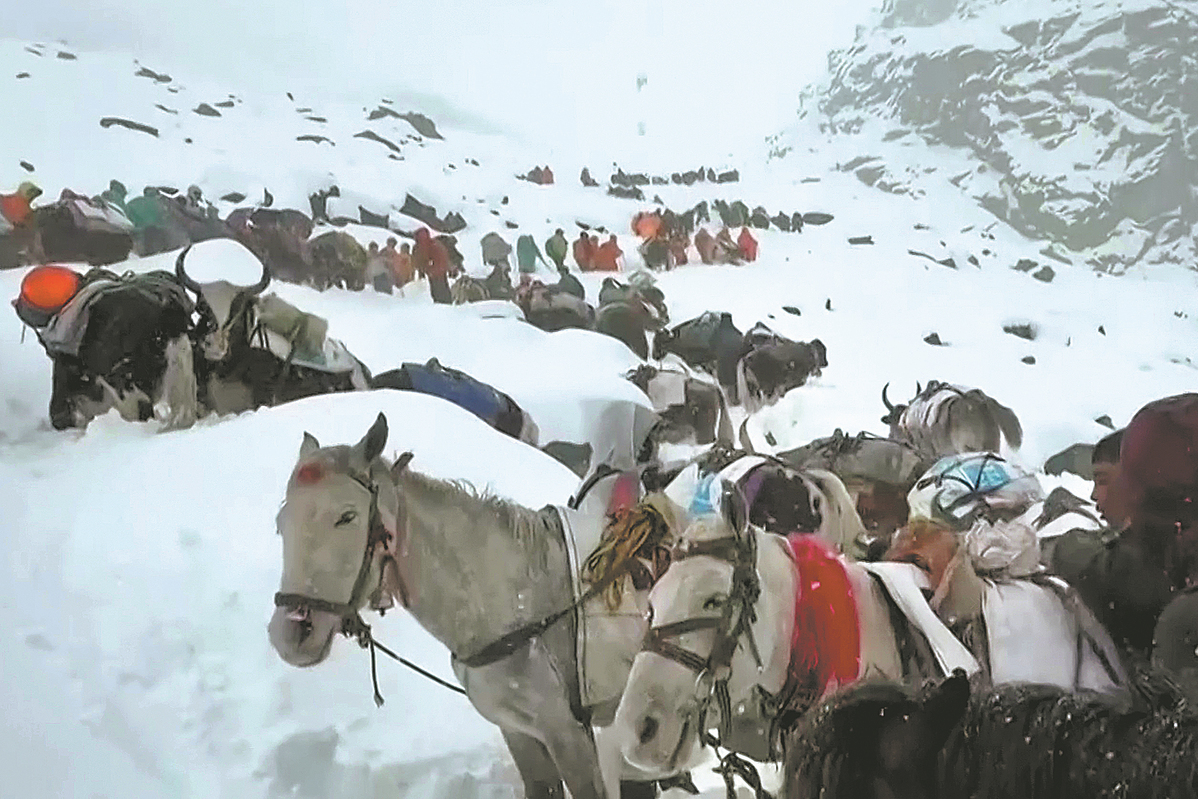Stronger safety awareness advocated


A heavy snowstorm that hit the Xizang autonomous region and neighboring areas during the National Day holiday, trapping for several hours hundreds of climbers on the eastern slope of Qomolangma, as well as on the Lenglong Mountains in Qinghai province, has prompted renewed calls for stronger safety awareness when participating in outdoor activities.
Experts from the Ministry of Emergency Management and outdoor professionals urged travelers to plan rationally, follow safety guidelines and avoid challenging routes without proper preparation.
On Saturday, a sudden snowstorm struck a campsite on Qomolangma, also known as Mount Everest, in Dingri county of Shigatse, Xizang, leaving nearly 1,000 trekkers, local guides and porters stranded. Local authorities quickly mobilized rescue teams comprising police personnel, firefighters and medics, and the trapped climbers were brought to safety.
Ngakwang Dorje, a seasoned guide working with Xizang Snow Eagle Alpine Outdoor Sports Co, recalled that it started raining in the Karma valley on Friday morning, and by afternoon, it was already snowing.
"We were camping near Tso Shodrima Lake at about 4,950 meters. The snowfall intensified on Saturday, reaching a depth of nearly half a meter," he said, noting that all trekking activities were immediately suspended due to safety risks.
"Rescue teams arrived with food and supplies, and we reached Choedang township on Sunday, but some others were still stranded," he said, adding that the snowstorm was unusually intense and some groups were caught unawares because they lacked professional weather forecasting support.
According to local authorities, more than 580 trekkers and 300 local guides and porters had safely reached Choedang and nearby areas by Tuesday night.
The Qomolangma incident was not the only case of safety hazard during the holiday.
On Sunday, police in Menyuan county in Qinghai received reports about hikers being trapped after crossing into the Laohugou area from Su'nan county in neighboring Gansu province.
According to China Central Television, the expedition to cross the Lenglong Mountains — a noncommercial and high-altitude route known for its unpredictable weather — was organized online. The average elevation in the area exceeds 4,000 meters, and the terrain is particularly complex, which presents challenges for rescue efforts, especially amid inclement weather.
Nevertheless, by Monday, 213 people were rescued and relocated, while one hiker died from hypothermia and altitude sickness, authorities said.
Dawa Tsering, executive director of Tibet Shambhala Adventure Co, said the Qomolangma incident exposed weaknesses in terms of logistics and preparedness.
"Without reliable guides, sleeping bags suitable for extreme cold, satellite phones and first-aid kits, things can quickly take an extreme turn in harsh weather," he said, adding that when the area is packed with visitors, rescue efforts also take time.
According to a CCTV report in May, China's sports equipment market is expected to reach 602.1 billion yuan ($83 billion) in 2025, up 14.2 percent year-on-year. Qomolangma has also seen a surge in visitors, receiving over 540,000 tourists this year, an 18 percent increase from 2024.
A veteran outdoor guide, who uses the name Yuanwaishu2012 on Sina Weibo, said in a post on Tuesday that professional experience is essential for such expeditions.
"More than half of those who went to Qomolangma lacked the necessary training and endurance. Without rescue operations, the outcome could have been far worse," the post said.
Zhu Yueqin, deputy director of the Urban Disaster Research Center at the ministry's National Institute of Natural Hazards, reminded travelers to avoid "three 'no' areas" — places with no supervision, no emergency plans and no supplies.
She advised them to stick to approved scenic routes, carry proper navigation and emergency gear, and avoid venturing out during extreme weather.
Contact the writers at zhaoruinan@chinadaily.com.cn
- Stronger safety awareness advocated
- 'Urban mining' of waste energizes circular economy
- Encounter Shandong: A cultural journey across borders
- 'Chicken steak brother' turns small city into instant hit
- Curtain comes down on Shanghai's popular tourism festival
- Local team effort enables evacuation of hikers from Qomolangma





































